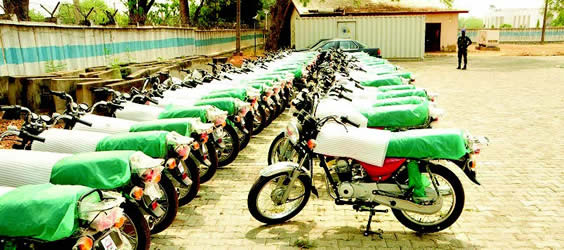The Motorcycle Manufacturers Association of Nigeria has accused government officials of neglecting local motorcycle makers, hinting at plans to write a formal appeal to the National Assembly urging lawmakers to adhere to the Nigeria First procurement policy by patronising locally assembled motorcycles for constituency projects.
In a phone interview with The PUNCH, Chairman of MOMAN, Lambert Ekewuba, lamented that despite the existence of a longstanding policy mandating government ministries, departments, and agencies to patronise local manufacturers, lawmakers and government officials continue to flout it by importing motorcycles through private dealers.
Ekewuba said the association is preparing to remind both the Senate and the House of Representatives in writing that the law bars individuals or organisations without local assembly plants from importing motorcycles.
“What we have been discussing in MOMAN is how we are going to write to the National Assembly, both the Senate and the House of Representatives, reminding them of this policy,” he said.
Ekewuba noted that despite massive investments in factories and skilled labour, local assemblers continue to lose contracts worth hundreds of millions of naira to individual contractors and unregistered mechanics who import motorcycles and couple them informally.
“Imagine if all our senators were buying vehicles from locally assembled producers. MDAs, ministries, and local governments would provide a lot of jobs because many factories would be busy producing,” he said.
He alleged that lawmakers were sidestepping the system by applying to the Ministry of Finance for duty waivers to import motorcycles under the guise of empowerment, directly contravening the procurement policy.
“We have a case where a politician wants to empower his people with motorcycles, and they go to the Ministry of Finance and apply for a concession to buy motorcycles rather than patronise MOMAN members. That is against the policy,” Ekewuba argued.
In 2017, the government of President Muhammadu Buhari signed Executive Order 003, titled ‘Support for Local Content Procurement by Ministries, Departments and Agencies of the Federal Government,’ into law. The order mandated all Federal Government MDAs to grant preference to local manufacturers in their procurement of goods and services as part of efforts to boost local production and patronage of Nigerian-made goods.
Critics lament the poor implementation of Executive Order 003. To build back on the policy, President Bola Tinubu in May approved the ‘Nigeria First’ procurement policy.
Meanwhile, the Senate is considering new legislation to bolster the automotive sector. On May 15, lawmakers in the Senate advanced the second reading of the Local Automobile Industry Patronage Bill 2025, which will mandate all government MDAs to prioritise vehicles made by indigenous manufacturers. It also provides enforcement of the ‘Nigeria First’ procurement policy.
Ekewuba stressed that Nigeria does not lack procurement laws but has a problem with implementing them. “We have always advocated that ministries, the police, and other MDAs should buy locally made motorcycles, but they don’t,” he said, lamenting violations of the existing regulations.
He decried the lack of punitive measures for such violations, arguing that enforcement by agencies, including the Ministry of Finance and the Nigeria Customs Service, must align with the automotive policy.
“The MDAs and individuals import directly, and the Ministry of Finance gives them approval letters without any recourse to MOMAN, whose members have invested heavily in equipment and machinery,” he said.
Ekewuba emphasised that motorcycle assembly is not the same as motorcycle repair, warning against what he described as a trend amongst government officials hiring the services of untrained roadside technicians to assemble imported motorcycles for constituency programmes.
“It’s against the policy that a Senator who does not own a registered factory imports motorcycles to be assembled by untrained mechanics,” he stated.
He urged the National Assembly to buy motorcycles from local assemblers, especially during election campaigns and empowerment exercises, arguing that increased local patronage would create massive employment opportunities across the country.
“If one Senator or one House of Representatives member makes an order for 500 motorcycles, each costing N1.2m, that is N600m. With such demands, our factories would employ more hands and reduce unemployment,” he remarked.
Meanwhile, they revealed that none of the MOMAN members had ever received an order from any senator or federal lawmaker directly, recollecting, “I asked my members, ‘How many of you have supplied these senators (with motorcycles)?’ Not one answered in the affirmative.”
He attributed the problem to profiteering by lawmakers, who would rather circumvent local producers to maximise personal gains from their constituency funds.
“They want to make money. Most of them are getting money for constituency projects. If the constituency project is N20m, they calculate how much profit they’ll make. Buying locally might cost them that full N20m, but importing through their proxies costs less, and the rest becomes profit,” he explained.
Ekewuba also dismissed claims that Nigerian-made motorcycles were of lower quality, stressing that local factories use calibrated assembly lines that maintain technical standards for critical components such as brakes and clutches.
“A roadside mechanic can never assemble 10 motorcycles with the same level of quality. At some point, they will get tired. But on an assembly line, we set the torque range correctly for all components,” he said.
He called on the National Assembly to support Nigerian manufacturers by complying with the existing procurement policy, warning that the country continues to lose revenue and jobs due to policy neglect.
“We are losing a lot of money. And that means we are also losing jobs. But we will not stop advocating. We will write and remind the lawmakers. We just want them to remember us,” Ekewuba said.















